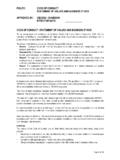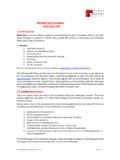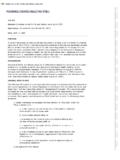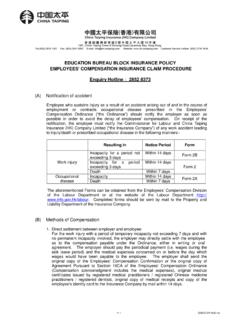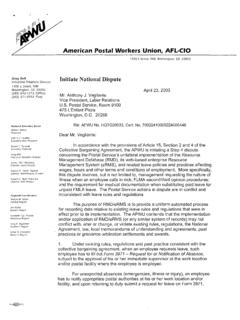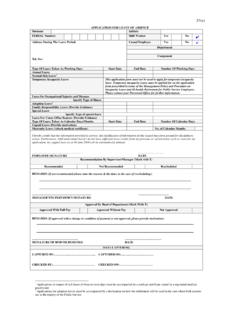Transcription of POLICY: DISCIPLINARY AND GRIEVANCE CODE …
1 Page 1 of 11 policy : DISCIPLINARY AND GRIEVANCE CODE APPROVED BY: CBCHOA CHAIRMAN: _____ EFFECTIVE DATE: _____ DISCIPLINARY CODE Introduction The purpose of this DISCIPLINARY code and DISCIPLINARY procedure is necessary to ensure that all employees are treated in a fair and consistent manner, when DISCIPLINARY action is required. It is however, neither rigid nor inflexible and management may at its discretion, implement less or more severe DISCIPLINARY action as and when required. It is the responsibility of management to maintain discipline at the Company and the code recognises the right of management to initiate DISCIPLINARY action against any employee where circumstances so warrant. Infringements, offences and penalties The DISCIPLINARY procedure will be initiated against any employee who contravenes the DISCIPLINARY code, or who acts against the interests of the Company or who commits any social, criminal or other offence.
2 The DISCIPLINARY penalties may include a verbal warning, a written warning, a final written warning and/or dismissal. Punitive suspension and/or demotion may only be given as alternative to dismissal. Cumulative nature of DISCIPLINARY action The Company supports the tenets of the new Labour Relations Act 66/1995 and to this end implements a system of progressive discipline. This code makes provision for progressive DISCIPLINARY action in each category of the offence. The DISCIPLINARY action prescribed by the code may be deviated from where justified by the particular circumstances of the case. Such action may be more severe than the prescribed guideline where aggravating circumstances exist or less severe where mitigating circumstances exist. In certain circumstances and in the case of certain offences, a dismissal sanction may be taken for a first offence.
3 Formal DISCIPLINARY action is defined as any action where a reprimand is given to an Employee in a formal manner and where a written record of such action is kept on the personal file of the Employee concerned. It should be noted that in most cases the Superior will have discussed the relevant misdemeanour with the employee concerned and have given an informal verbal warning before administrating formal discipline as detailed below. However in certain circumstances, a transgression of this code may be deemed sufficiently serious to carry a written warning or even a dismissal for the first offence. It is therefore intended to be a guide for both management and employees, listing the more common misdemeanours and the appropriate action to be taken. The list is not all-embracing and the Company reserves the right to discipline an employee for good cause even though the specific offence may not be stated in this list.
4 Each case will be treated on its merits and discretion exercised so as to ensure discipline is applied in a fair and consistent manner. This code forms part of the employee's Contract of Employment. Page 2 of 11 DISCIPLINARY Procedures There are basic principles which govern the way in which potential DISCIPLINARY matters are to be dealt with. Procedural Fairness A fair procedure must be followed to ensure that both the Company s and the employee s interests are safe guarded. Notification: Schedule the DISCIPLINARY enquiry, allowing at least 3 written days notice as to allow enough time for the employee to prepare his / her case. The nature of the offence must be stated in the notice The right to call witnesses and have a representative present must be made clear If the review will be held in a language where the employee may require an interpreter, this should be offered Details of the venue, time and date of the DISCIPLINARY enquiry must be stated The route that this procedure should follow is: The Estate Manager will advise the employee of the charges against him/her as per notification above.
5 In the case of a charge against the Estate Manager then the CBC Chairman will advise him of the charges against him/her. Ensure that the employee is aware and understands his / her rights. The employee should be allowed to state his / her case in response to the allegations made against him / her. On request, the employee should be allowed representation, either from fellow employees or a shop steward from within the constituency. After the enquiry the Company should advise the employee of the decision taken, the reason for the decision and remind him of his right to appeal and to refer the matter to the Bargaining Council or CCMA. Estate Manager must keep minutes in the employees file of each hearing. Incapacity In addition to these requirements additional steps prior to the institution of a DISCIPLINARY enquiry, need to be in place in the event of incapacity to ensure that the procedural fairness requirements of the LRA (Labour Relations Act) are met.
6 Incapacity: poor performance Ensure that the reasons for poor performance have been properly investigated. Ensure that every effort has been made to assist the employee to improve the standard of his performance. Introduce a Performance Improvement Plan if necessary. Incapacity: ill health Investigate the extent of the incapacity and prognosis for recovery. Consider the period of absence and seriousness of the illness. Investigate the possibility of relocating the employee to another department or job, taking into account the employee s ability to perform at the required levels. Absence without leave If an employee is absent without authorisation for 5 working days, he/she will be considered to have absconded. The process to be followed is as follows: The Estate Manager is to attempt to make contact with the employee requesting that he/she contact the office before a certain date, and inform him/her that failure to do so will result in our assumption that he/she has absconded.
7 At the expiry of three days, the Estate Manager will lay a formal complaint of desertion. The employee will be advised of this via a registered letter advising the employee of a DISCIPLINARY enquiry to be held for unauthorised absence and that should he fail to contact the office or report within a specified date, the enquiry would be held in his absence which may lead to his dismissal. Page 3 of 11 Should the employee not respond, on the sixth day, the Estate Manager will advise via a registered letter of the DISCIPLINARY enquiry, providing all the relevant information. A DISCIPLINARY enquiry is to be convened and a review or appeal will only apply after the dismissal if appropriate. Substantive Fairness Substantive fairness deals with the nature and extent of the offence. It is incumbent on the company to ensure the following has been considered before a decision is made as to what sanction is applicable.
8 Misconduct Was there a breach of a rule and if so, was the rule valid and reasonable? Was the employee aware, or could be reasonably expected to be aware of the rule? Has the company consistently applied the rule? If the breach of the rule results in dismissal then was the dismissal the appropriate sanction considering : - The personal circumstances of the employee - The nature of the job - The circumstances surrounding the breach of the rules - Whether the action taken is consistent with previous cases Incapacity: Poor Performance Did the employee fail to meet the required standards? Was the employee aware, or could be reasonably expected to be aware, of the required work standards? Are the work standards fair and legitimate? What was the degree of sub-standard performance? Was the employee given a fair opportunity to meet the required standards? If the poor performance results in dismissal then was dismissal the appropriate sanction considering : - The extent of training given to the employee.
9 - The availability of an alternative position/demotion. - Whether the action taken is consistent with previous cases. Incapacity: ill health or injury Investigate the extent of incapacity and prognosis for recovery. The degree of incapacity is relevant to the fairness of any dismissal. The cause of the incapacity may also be relevant. In the case of certain kinds of incapacity alcoholism or drug abuse, counselling and rehabilitation may be appropriate steps for an Employer to consider. Particular consideration should be given to employees who are injured at work or who are incapacitated by work-related illness. The duty of the Employer to accommodate the incapacitated employee is more onerous in these circumstances. In determining whether a dismissal arising from ill health or injury is or may be unfair, the Company should consider: Whether or not the employee is capable of performing the work.
10 If the employee is not capable: - The extent to which the employee is able to perform the work. - The extent to which the employee s work circumstances might be adapted to accommodate disability, or, where this is not possible, the extent to which the employee s duties might be adapted. - The availability of any suitable alternative work If the incapacity is deemed to be permanent then investigate the availability of an alternative position. PROCEDURE TO DEAL WITH WARNINGS IS AS FOLLOWS: Verbal Warning May be given in cases where, in the opinion of the immediate Supervisor or Manager, the misconduct is of a relatively minor nature not warranting a written warning. Such reprimands are to be given in private and need not be reflected in the employee s personal file but should be recorded nevertheless in a diary or note book. Page 4 of 11 Written Warning All written warnings must be completed in duplicate, one copy to the employee, the original to the employee s personal file.
